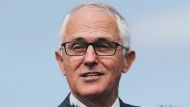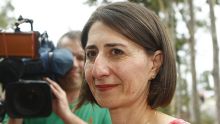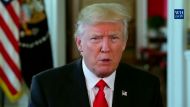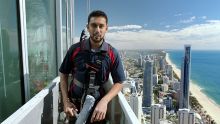Washington: As US President Donald Trump's order targeting citizens from seven predominantly Muslim countries reverberated across the world on Saturday, it became increasingly clear that the controversial measure he had promised during his presidential campaign was casting a wider net than even his opponents had feared.
Confusion and concern among immigrant advocates mounted throughout the day as travellers from the Middle East were detained at US airports or sent home. A middle-of-the-night lawsuit filed on behalf of two Iraqi men challenged Trump's executive action, which was signed on Friday and initially cast as applying to refugees and migrants.
More Videos
Trump travel ban sparks lawsuits, panic abroad
US President Donald Trump's executive order temporarily barring visitors from seven predominantly Muslim countries and banning Syrian refugees indefinitely will likely land his administration in court.
Amid mounting chaos a US federal judge issued an emergency stay that temporarily blocked the government from sending people out of the country after they have landed at a US airport with valid visas.
The American Civil Liberties Union estimated the stay would affect 100 to 200 people detained at US airports or in transit, but government lawyers could not confirm that number.

Judge Ann Donnelly of the US District Court in New York made the order on Saturday.
As the day progressed, administration officials had confirmed that the sweeping order also targeted US legal residents from the named countries - green-card holders - who happened to be abroad when it was signed. Also subject to being barred entry into the US are dual nationals, or people born in one of the seven countries who hold passports even from US allies such as Britain.
Among those blindsided were 50 people detained at Dallas-Fort Worth International Airport.
Dozens of people showed up there in support of Muslim families, some carrying signs protesting Friday's order.

"Refugees are welcome here!" one read, and another said: "We turned Jews back, now Muslims?"
The growing crowd in Terminal D erupted into jubilant chants of "USA! USA! USA!" when Arya Neal Behgooy of Plano and his wife, Shima, emerged from the door that spits out international travellers.
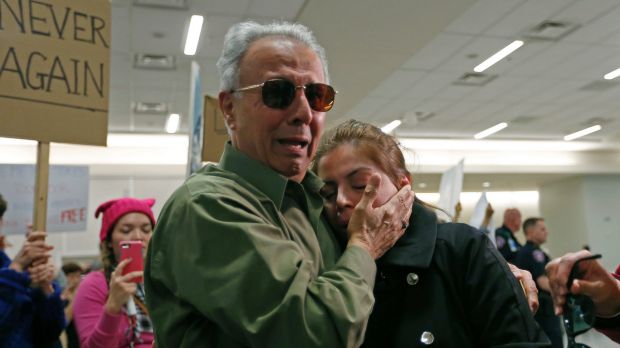
Arya Behgooy is a US citizen. Shima Behgooy is a green-card holder from Iran.
Ahmad Behgooy embraced Arya, his son. Shima dissolved into the arms of her mother-in-law, Afsaneh Behgooy, who was holding a bouquet of roses that had begun to wilt during the hours-long wait.
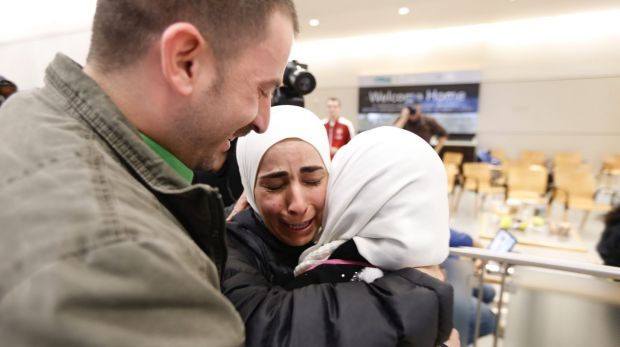
Shima and her husband had flown from Tehran to Frankfurt, Germany. Mid-flight on their way to Dallas, the couple learned about the ban on travellers from Iran, including green-card holders.
Immigration officers ultimately gave Shima an exemption, her husband said, though he noted that 30 to 40 other travellers were still being held.

Dallas mayor Mike Rawlings made his feelings about Trump's order known at a downtown news conference on Saturday night.
"It's just not good for our city. It's not good for the state," Rawlings said. "This is not a solution. This is a foul insult to the rest of the country."

Miriam Yasin was eventually reunited with her 54-year-old mother, Najah al-Shamieh.
"It feels so good, but it's sad for the other ones," Yasin said, the crowd cheering at their tearful reunion. "I feel like I want to stay here for the other ones."
Alia Salem, executive director of the Council on American-Islamic Relations (CAIR), said about 50 people had been detained at Dallas-Fort Worth on Saturday morning.
By midafternoon that number was down to nine, some joined by local family members in a detention area at the airport.
The virtually unprecedented measures triggered harsh reactions not only from Democrats and others who typically advocate for immigrants but also key sectors of the US business community. Leading technology companies recalled scores of overseas employees and sharply criticised the President. Legal experts forecast a wave of litigation over the order, calling it unconstitutional. Canada announced it would accept asylum applications from US green-card holders.
Yet Trump, who centred his campaign in part on his vow to crack down on illegal immigrants and impose what became known as his "Muslim ban", was unbowed. As White House officials insisted that the measure strengthens national security, the President stood squarely behind it.
"It's not a Muslim ban, but we were totally prepared," Trump told reporters in the Oval Office. "You see it at the airports, you see it all over. It's working out very nicely, and we're going to have a very, very strict ban, and we're going to have extreme vetting, which we should have had in this country for many years."
Governor Cuomo, protecting the right to protest. #MuslimBan pic.twitter.com/KWnBAHCFRc
— deray mckesson (@deray) January 29, 2017
Though several congressional Republicans denounced the order, the vast majority remained silent and a few voiced crucial support - including, most prominently, House Speaker Paul Ryan, who had rejected Trump's anti-Muslim proposals during the campaign.
"This is not a religious test, and it is not a ban on people of any religion,'' Ryan said on Saturday. "This order does not affect the vast majority of Muslims in the world."
The President's order suspends admission to the US of all refugees for 120 days and bars for 90 days the entry of any citizen from Iraq, Iran, Syria, Yemen, Sudan, Libya and Somalia. That list excludes several majority-Muslim nations - notably Turkey, the United Arab Emirates and Indonesia - where the Trump Organisation, now run by the President's sons, is active and which in some cases have also faced troublesome issues with terrorism.
According to the text of the order, the restriction applies to countries that have already been excluded from programs allowing people to travel to the US without a visa because of terrorism concerns. Hewing closely to nations already named as terrorism concerns elsewhere in law might have allowed the White House to avoid angering majority-Muslim allies such as Egypt and Saudi Arabia.
January 28, 2017. #muslimban #nobannowall JFK O'Hare BOS DFW SFO SEA Dulles DEN LAX pic.twitter.com/zzduGp9AqP
— Nadene Rehnby (@queennadene) January 29, 2017
Amid widespread confusion on Saturday about how the order will be enforced, some administration officials acknowledged that its rollout had been chaotic. Officials tried to reassure travellers and their families, pointing out that green-card holders in the United States will not be affected and noting that the Department of Homeland Security is allowed to grant waivers to those individuals and others deemed to not pose a security threat. It can take years for someone to become a green-card holder, or lawful permanent resident authorised to permanently live and work in the country.
"If you've been living in the United States for 15 years and you own a business and your family is here, will you be granted a waiver? I'm assuming yes, but we are working that out,'' said one official, who could not be more specific because details remained so cloudy.
Love is what makes America great! This is happening at Dulles right now. #MuslimBan #Dulles #NoBanNoWall pic.twitter.com/WP3XrzeCeo
— Annabel Park (@annabelpark) January 29, 2017
A senior White House official later said that waivers will be evaluated on a case-by-case basis and that green-card holders in the United States will have to meet with a consular officer before leaving the country.
But officials made clear that the federal officers detaining refugees and migrants with valid US visas and restricting them from entering the country were following orders handed down by top Homeland Security officials, at the White House's behest.
More than 4000 academics from universities nationwide signed a statement of opposition and voiced concern the ban would become permanent. They described it as discriminatory and "inhumane, ineffective and un-American".
The executive action has caused "complete chaos" and torn apart families, said Abed Ayoub, legal and policy director of the American-Arab Anti-Discrimination Committee.
At Dulles International Airport, Virginia governor Terry McAuliffe addressed more than 100 people protesting Trump's order.
"We want to know who is being detained and why they are being detained," McAuliffe said. "I remind everybody we are a land of immigrants. . . . Discriminatory tactics breed hatred.''
His remarks were cheered by demonstrators holding signs saying "Refugees welcome here" and "Stand with Muslims".
Protesters lock hands and circle around people praying at Denver International Airport. #MuslimBan #resist #Colorado pic.twitter.com/6wLxHRzvmu
— Lilly (@LillyArabia) January 29, 2017
In New York City, lawyers for two Iraqi men detained at John F. Kennedy International Airport - one of whom, Hameed Khalid Darweesh, served the US military mission in Iraq - filed a federal lawsuit challenging the order as unconstitutional. They also are seeking class certification so they may represent all refugees and visa-holders who are being held at US ports of entry.
"We have a moral obligation to protect and repay these people who risked their lives for US troops," said Brandon Friedman, who, as an infantry lieutenant with the 101st Airborne Division, worked with Darweesh in Iraq.
"There are not many Americans who have done as much for this country as he has. He's put himself on the line," Friedman added. "He's put his family on the line to help US soldiers in combat, and it is astonishing to me that this country would suddenly not allow people like that in."
Outside the terminal, Darweesh was greeted by his advocates after nearly 19 hours in detention, as well as protesters opposed to the Trump policy who had come to the airport to support him and the others who had been detained.
Although shaken, Darweesh paused to speak to the media before moving on to reunite with his family. A reporter asked if he was angry. "No, because I have these people," he said, gripping his lawyer's shoulder. "This is America."
While immigration advocates said at least one refugee family had been detained at San Francisco International Airport, there was no immediate count of how many refugees were being held at airports nationwide. Advocates said that ticketed passengers also had been barred from boarding US-bound flights overseas, and they confirmed that green-card holders who left the United States have been unable to return.
In Cairo, airport officials said seven US-bound migrants - six from Iraq and one from Yemen - were prevented Saturday from boarding an EgyptAir flight to JFK Airport, according to the Associated Press.
Other advocates promised further legal challenges. CAIR said it would file a lawsuit challenging it as unconstitutional.
"There is no evidence that refugees - the most thoroughly vetted of all people entering our nation - are a threat to national security," said Lena Masri, CAIR's national litigation director. "This is an order that is based on bigotry, not reality."
In a conference call with reporters, immigration lawyers and advocates said Trump's order violated the Constitution, along with US and international laws that guarantee migrants the right to apply for asylum at the border and the 1965 Immigration and Nationality Act, which forbids discrimination in the issuance of visas based on race, nationality, place of birth or place of residence.
But Mark Krikorian, executive director of the Centre for Immigration Studies, which advocates for lower immigration levels, praised Trump for taking action to pause the refugee resettlement program and limit immigration from the seven countries.
"It's a prudent measure," he said. "It's not the end of the world. It's not the Statue of Liberty crying. The reaction has been hyperbolic."
The effects of Trump's order played out nationwide.
In Dallas, Behzad Honarjou, 43, was supposed to pick up his mother, 70-year-old Shahin Haffanpour, at the airport on Saturday. But when she arrived from Iran via Dubai, she was told that because of the executive order she would be sent back to Iran the next morning.
"I don't know what to do," Honarjou said. He said he was seeking an attorney to file an emergency habeas petition, but the courts were closed. Haffanpour has an immigrant's visa issued by the US embassy in Ankara, Turkey, last year.
In Philadelphia, Sarah Assali said six relatives from Syria - two uncles, their wives and two cousins - were detained after arriving at the airport there early Saturday. Although they are Christian immigrants with valid visas to join family in this country, they were put on a plane back to Doha, Qatar, three hours later, Assali said.
She said her family members were not allowed to call or contact their family in the United States before being removed. "We don't know what's going to happen next."
Washington Post, New York Times, Dallas Morning News


